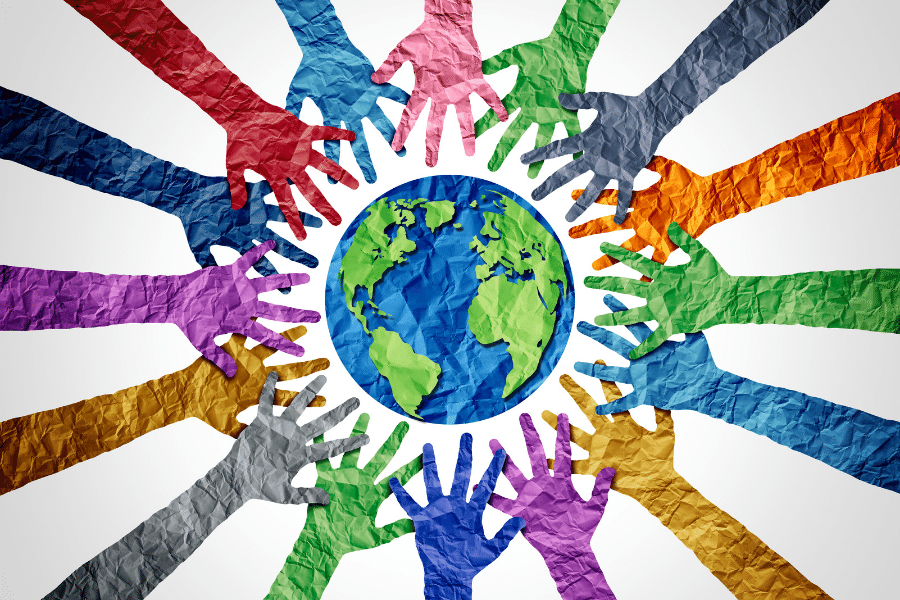There’s no question to those who are aware that we must embrace diversity and that it’s very important for everyone in this world. As far back as I can remember, I was painfully aware when my family tried to “insist that everyone be just like them”. In fact, if someone was different from them, it seemed to be an absolute crime. Today, I’m certain it was fear-based. But, growing up in a small town with an unusually diverse culture, that’s a behavior that confused me because I loved all of my friends. But, coming from a family that traveled the Oregon Trail from Tennessee, there was a deep-seated prejudice. Be it from the southern roots or the strong will to survive great adversity in traveling over the Oregon Trail and homesteading, it existed and I was aware of it.
Please understand that I don’t pat myself on the back because I was born with a questioning mind. However, I believe I was born with the ability to not blindly accept the status quo. I simply can’t remember a time in my life when disparaging remarks about any group or individual didn’t deeply bother me. Admittedly though, the stigma of prejudice is no doubt in my DNA and I must continue the work to eradicate it. Even as disdainful as I rationally find it, there is no escaping this fact. But, like many things in life, admitting it is the first step and the next step is the work to overcome. Or, shall we say, unlearn?
Unlearn to Embrace Diversity

For one thing, science tells us that the term “race” is an archaic term that has no merit or meaning. Why? Because, we are all from the same black woman in Africa. In truth, we are all one race – the human race. So, race is truly a figment of our imagination. But, this is not the only stigma that we must work to change, in our minds and in our hearts.
As the world struggles to fully embrace a higher awareness, prejudice continues to plague our society in many ways. Even after so many years of striving, it continues to require patience, understanding, and most importantly, we must unlearn.
For successful unlearning, we must first fully acknowledge the harm from lack of awareness and work towards creating a more inclusive society that accepts people from all backgrounds and sexual orientations. At the same time, we must break down the barriers that divide us and in its place, create a sense of unity.
Embrace Diversity with Higher Awareness
Some examples of diversity are ethnicity, gender, sexual orientation, age, religion, and socioeconomic status. It isn’t difficult to see that celebrating diversity enriches our society, promotes creativity, and fosters innovation. However, old beliefs of prejudice create barriers for embracing diversity. The belief that one group is superior to another continues to manifest in actions, attitudes, and beliefs. Moreover, it’s is also evident in our society through policies, practices, and laws. I don’t think I need to tell anyone that it has a profound impact on society that lead to discrimination, inequality, and violence.
Prejudice takes many forms, including individual prejudice, systemic prejudice, and structural prejudice.
- Individual prejudice is when an individual holds prejudice beliefs or behaves in a discriminatory manner towards another person or group.
- Systemic prejudice is when institutions or systems, such as the criminal justice system or education system, perpetuate prejudice practices and policies.
- Structural prejudice is built into the very fabric of society, such as through housing policies or employment practices.
Understanding these different forms of prejudice is essential in promoting diversity.
The Negative Impact of Prejudice on Society

With its negative impact on society, it has long-term effects on individuals and communities. Not surprisingly, prejudice leads to lower life expectancy, higher rates of chronic illness, and lower levels of educational attainment. What’s more, it impacts mental health, with individuals experiencing prejudice reporting higher levels of anxiety, depression, and stress.
There are also great economic consequences. Individuals with the right qualifications are passed over for jobs, which results in a huge wealth gap. prejudice also impacts access to affordable housing and healthcare, leading to great disparities in health outcomes and quality of life.
Moreover, the impact of prejudice is not limited to those who experience it directly as it also impacts society as a whole, leading to social unrest, political polarization, and a breakdown of social cohesion. The impact is tremendous.
We Must Create a More Inclusive Society

When we strive to embrace diversity, we naturally create a more inclusive and equitable society. It fosters creativity, innovation, and problem-solving. It also helps to challenge our assumptions and biases, which increases our awareness and gives us greater understanding.
In terms of social justice, recognizing and valuing diversity stops discrimination and inequality. Embracing diversity also means creating a society where everyone has equal opportunities.
When we embrace diversity, we break down the barriers that divide us and create a sense of community. Recognizing and valuing the unique contributions of each individual and working towards a common goal are all ways to embrace diversity.
Step-by-Step to Help Unlearn
Unlearning prejudice isn’t easy for anyone because it runs so deep. In fact, it requires a conscious effort to constantly challenge our assumptions and beliefs. Here are some steps we can take to unlearn prejudice:
1. Acknowledge the harm:
It’s essential to recognize the harm caused by prejudice and acknowledge the role that we play in perpetuating it. It’s important for both individual and society as a whole to take responsibility for our actions and work towards making amends.
2. Educate ourselves:
We must make it our business to learn about the history of prejudice, its impact on society, and how to work towards creating a more inclusive society. Reading books, attending workshops, and engaging in discussions with those who are experts about racism are ways to do this.
3. Listen and empathize:
Listening to those who experience it every day of their lives is essential in unlearning prejudice. We need to listen to their experiences and empathize with their pain. Listening helps us understand the impact of prejudice and motivates us to work towards change.
4. Challenge our assumptions and biases:
We all have biases, and it’s essential to recognize them and challenge them. So, we must question our assumptions and beliefs and work towards developing a broader perspective.
5. Take action:
Action is required to unlearn. That includes actively working towards creating a more inclusive society by challenging all prejudice, advocating for social justice, and promoting diversity.
Education as a Key to Unlearning
Education provides us with the knowledge and skills needed to challenge prejudice and promote diversity. We must also ensure that the education itself is inclusive and reflects the diversity of our society.
Education takes many forms, including formal education, informal education, and experiential learning.
- Formal education, such as schools and universities, provide us with a foundation of knowledge and skills.
- Informal education, such as reading books and attending workshops, helps us to deepen our understanding of racism and diversity.
- Experiential learning, such as engaging in discussions with those who experience prejudice, helps us to develop empathy and perspective.
Remember, education is not always about learning; it’s also about unlearning the beliefs and assumptions and work towards a more inclusive worldview.
The Role of Empathy and Listening

A big part of embracing diversity includes an understanding of the feelings of others. In so doing, we develop empathy that helps us connect and develop a deeper understanding of their experiences.
Listening helps us understand the impact of racism while helping us challenge our biases and develop a broader perspective.
However, empathy and listening are not just about understanding; they are also about action. These positive actions motivate us in creating a more inclusive society by advocating for social justice, and promoting diversity.
The Role of Language and its Impact
Language either perpetuates prejudice beliefs or challenges them. Simply stated, using derogatory language towards an group perpetuates racism while using inclusive language that recognizes and values diversity promotes inclusivity.
For another example, using language that recognizes and values the unique contributions of individuals from different backgrounds challenges stereotypes and biases.
But, language is not just about the words we use; it’s also about the tone and context in which we use them. We must continue striving for active mindfulness of our language and how it impacts those around us.
Overcoming Stereotypes and Biases
Stereotypes and biases are deeply ingrained in our society and are very difficult to overcome. However, it’s essential to challenge them if we want to promote diversity and unlearn prejudice. Here are some ways we can overcome stereotypes and biases:
1. Challenge our assumptions:
We must question our assumptions and beliefs and work towards developing a broader awareness. We do this by engaging with people from different backgrounds, reading books, and attending social activities that are diverse and inclusive.
2. Check our biases:
We all have biases, and it’s essential to recognize them and challenge them. Do this with mindfulness of thoughts and actively work towards developing empathy and understanding.
3. Education is vital:
Education is vital in overcoming stereotypes and biases. It is everyone’s responsibility to learn about the history of prejudice, its impact on society, and how we can create a more inclusive society.
4. Embrace diversity:
Embracing diversity helps us to overcome stereotypes and biases. We must recognize and value the unique contributions of individuals from different backgrounds to create a more inclusive society.
What Happens When We Embrace Diversity

Our worldwide society benefits greatly when we learn to embrace diversity. It impacts creativity, innovation, and problem-solving. It also promotes social justice by eliminating discrimination and inequality. When we embrace diversity, it also leads to a sense of community and unity by breaking down the barriers that divide us.
Of course, it follows that there are economic benefits. In the workplace, it leads to higher levels of productivity, creativity, and innovation. It also helps close the wealth gap by providing equal opportunities for all individuals.
Books to Help Unlearn Prejudice














Conclusion
It is our wish that you find this post enlightening and helpful. If you have any questions or suggestions, we love to hear from you in the comments below. Also, kindly accept our invitation to join our group on Facebook to surround yourself with kindred spirits and post your encouraging messages.
a








































